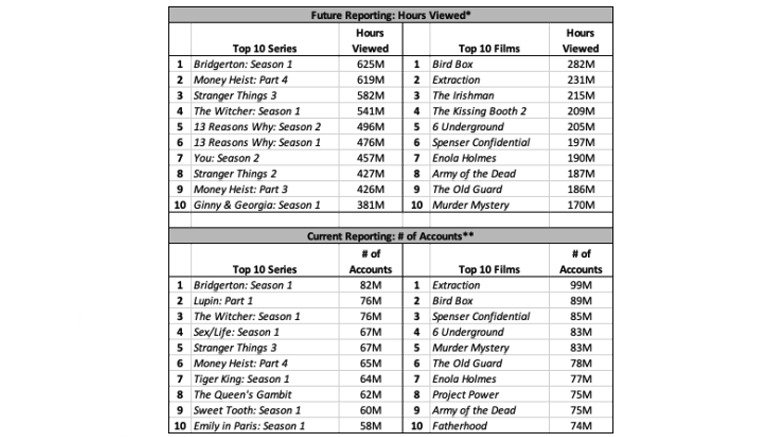Netflix Is Changing Its Viewership Metrics (And It's Somehow Even Worse Than Before)
Netflix has always been shady about the way it reports viewership numbers, and unfortunately, it looks like that trend will continue. The streamer announced yesterday that it will soon be changing the way it reports those kinds of metrics, moving from its current system — in which a "view" is counted as long as a subscriber watches two minutes of a piece of content — to a system that is even less helpful for outsiders trying to get an accurate sense of a given project's popularity.
Here is what the streamer said in a message to its investors:
Later in the year, we will shift to reporting on hours viewed for our titles rather than the number of accounts that choose to watch them. There is some difference in rankings, as you see below, but we think engagement as measured by hours viewed is a slightly better indicator of the overall success of our titles and member satisfaction ... In addition, we will start to release title metrics more regularly outside of our earnings report so our members and the industry can better measure success in the streaming world.
Here's a chart showcasing how this new method will reflect the streamer's new focus on overall streaming hours:
Why This New Metric is Useless
Let's create a fake example to illustrate how this will work. Under the current system, Netflix might announce something like "Squid Game was viewed by 100 million accounts across the world in its first week!" Reporters and people who care about this stuff would not know how many of those 100 million accounts actually watched the whole show, or indeed how many even got beyond the first two minutes of the first episode before bailing after deciding they were no longer interested. But at the very least, it seemed to indicate that a significant number of people were willing to give the project a chance. That's not exactly relevant information when trying to compare it to how well anything else performed, but it's slightly better than nothing.
Under this new system, though, Netflix will instead say something like "Squid Game racked up a million hours of viewing in its first week!" But that raises a whole host of questions. As The Washington Post reporter Steven Zeitchik put it on Twitter: "Did a million people check out the first episode and stop? Did 100,000 people watch all ten hours? Or maybe 30 million people each watched two minutes? Who knows!"
This means children's shows like "Cocomelon" should constantly be atop every list of the most popular Netflix content, because we all know how young kids like to watch and rewatch stuff ad nauseam. It also means hardcore fans of certain shows could juke the numbers by rewatching their favorite show every single day, racking up the total hours of time watched. Netflix hasn't clarified if it will count repeat viewings from the same account in part of its metric, but we're assuming it will since it wants that number to look as impressive as possible.
It's All About Wall Street
Over the past decade, Netflix spent literally billions of dollars on original content and licensing titles for its library, operating with massive amounts of debt for that entire time. It was only this past January the company finally said it would be able to pay down those debts and be cash-flow positive starting next year. And to be clear, Netflix does not have a legal obligation to provide viewership data that's easy and clear to understand. Sure, co-CEOs Ted Sarandos and Reed Hastings have been saying for years that they want to be more transparent, but at the end of the day, they run a tech company, which means they answer to Wall Street — and one thing Wall Street loves is flashy numbers.
That may be great for investors, but it continues to be a nightmare for people trying to look beyond hype and get a glimpse at solid figures to put the "success" of Netflix projects in the proper context. Unfortunately, this decision means we'll continue to spend a section of every article about Netflix's viewership numbers discussing how dumb it is that they won't give us a clearer look at what's going on. I've spent the past several years rolling my eyes at all of Netflix's big announcements about numbers for things like "Extraction," "Spenser Confidential," and "Stranger Things," but soon those types of announcements will be so far removed from any type of helpful criteria that they won't even warrant an eye roll.



